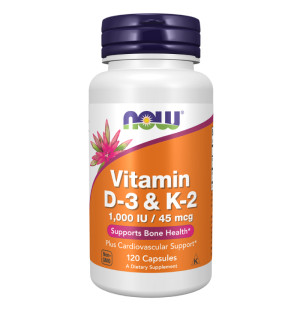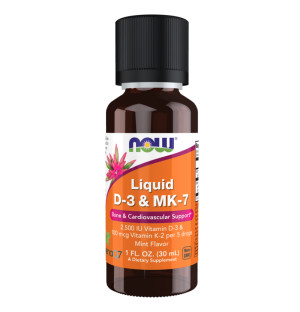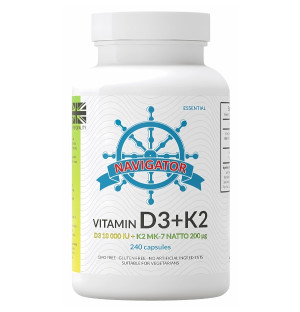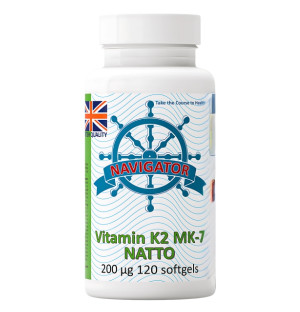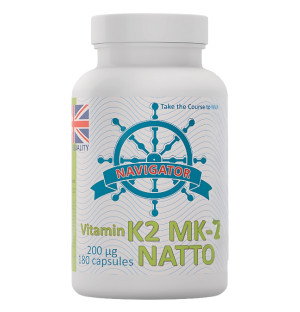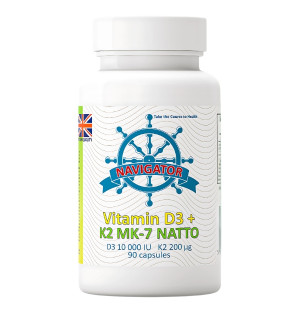Vitamin K
Vitamin K - key to bone health, blood clotting and heart health
Vitamin K is a fat-soluble vitamin that plays a key role in many physiological processes, including blood clotting, maintaining healthy bones and protecting blood vessels. Vitamin K is less well known than other vitamins such as vitamin C or vitamin D, but its importance to health is immense, especially in the context of cardiovascular health and the skeletal system.
Vitamin K comes in two main forms: Vitamin K1 (phylloquinone), which is mainly found in green leafy vegetables, and vitamin K2 (menaquinone), found in animal and fermented products such as natto. The two forms of vitamin K have different functions, but are essential for maintaining overall health and proper functioning of the body.
Main benefits and functions of vitamin K
✅ Blood clotting and vascular health
-
- One of the most well-known functions of vitamin K is the regulation of blood clotting. Vitamin K is necessary for the production of proteins that are responsible for the clotting process, which prevents excessive bleeding and facilitates wound healing. Vitamin K deficiency can lead to clotting disorders, resulting in longer bleeding times even in minor cuts or injuries.
- In addition to this, vitamin K2 plays a key role in protecting blood vessels by preventing calcium build-up in artery walls. It helps to redirect calcium where it is needed - to the bones - which protects against vascular calcification and supports cardiovascular health.
✅ Bone health and prevention of osteoporosis
-
- Vitamin K, especially in the K2 form, supports bone health by activating a protein called osteocalcin, which binds calcium and deposits it in the bones. Vitamin K2 works synergistically with vitamin D, meaning that both vitamins work together to help maintain strong, healthy bones. Regular supplementation with vitamin K can help prevent osteoporosis and reduce the risk of fractures, especially in older people and post-menopausal women.
- Research indicates that adequate vitamin K in the diet improves bone mineral density, which is key in preventing bone diseases such as osteopenia and osteoporosis.
✅ Protection against heart disease
-
- Vitamin K2, especially in the menaquinone-7 (MK-7) form, plays a key role in protecting the heart and blood vessels. By regulating calcium metabolism, vitamin K2 prevents calcium deposition in the arteries and other soft tissues, reducing the risk of atherosclerosis, hypertension and other cardiovascular diseases. Studies show that people with a higher intake of vitamin K2 have a lower risk of cardiovascular disease.
✅ S upporting the health of the nervous system
-
- Vitamin K is also important for the health of the nervous system. Research indicates that vitamin K supports normal brain function by protecting neurons from oxidative stress. In addition, vitamin K may play a role in improving cognitive function and protecting against neurodegenerative diseases such as Alzheimer's disease.
✅ S upport for skin health
-
- Vitamin K also has beneficial effects on skin health. Taking vitamin K in the form of a supplement or cream can help reduce dark circles under the eyes, bruising and promote scar healing. It promotes skin regeneration, which is particularly important for those with skin problems such as rosacea or other skin vascular disorders.
Forms of vitamin K
🟧 Vitamin K1 (phylloquinone): This is a form of vitamin K found mainly in green leafy vegetables such as spinach, kale, broccoli and lettuce. Vitamin K1 supports blood clotting and is essential for the production of clotting factors in the liver. Although K1 is readily available from the diet, its bioavailability (ability to be absorbed by the body) is lower than that of vitamin K2.
🟧 Vitamin K2 (menaquinone): Vitamin K2 is produced by bacteria in the gut and is found in fermented foods such as natto (fermented soya), some cheeses and animal products. Vitamin K2 is divided into several subtypes, the most important of which are MK-4 and MK-7:
-
- MK-4: Is the form of vitamin K2 that is found in animal products such as meat, eggs and dairy. MK-4 is rapidly absorbed by the body, but has a shorter duration of action than MK-7.
- MK-7: It is the most effective and bioavailable form of vitamin K2. Derived mainly from fermented foods such as natto, MK-7 has a longer half-life in the body, meaning it works longer and more effectively to support bone and cardiovascular health.
Symptoms of vitamin K deficiency
-
- Coagulation disorders: Prolonged bleeding after a cut, frequent nose bleeds, easy bruising and heavy menstruation can all be signs of vitamin K deficiency.
- Bone weakness: Vitamin K deficiency, especially K2, can lead to bone demineralisation, which increases the risk of osteoporosis and fractures, especially in the elderly.
- Increased risk of heart disease: Vitamin K2 deficiency can lead to calcification of blood vessels, which in turn increases the risk of atherosclerosis and other cardiovascular diseases.
Who should consider vitamin K supplementation?
❎ People at risk of osteoporosis: Postmenopausal women and older people who have an increased risk of bone density loss and fractures may benefit from vitamin K supplementation to support bone health.
❎ People with blood clotting problems: Vitamin K supplementation may help regulate blood clotting, especially in people who have difficulty absorbing fat-soluble vitamins.
❎ People with a diet poor in leafy vegetables: People who do not consume enough green vegetables may be at risk of vitamin K1 deficiency and should consider supplementation.
❎ People taking anticoagulants: These people should consult their doctor for adequate vitamin K levels as it may affect the effects of anticoagulants.
Summary
Vitamin K is essential for bone health, proper blood clotting and protection of the heart and blood vessels. Both vitamin K1 and K2 play key roles in maintaining calcium balance, which is of great importance for the prevention of bone and cardiovascular disease. Vitamin K supplementation, especially in the form of K2 (MK-7), can help prevent osteoporosis, atherosclerosis and support overall health, especially in the elderly and those at risk of vitamin K deficiency.

